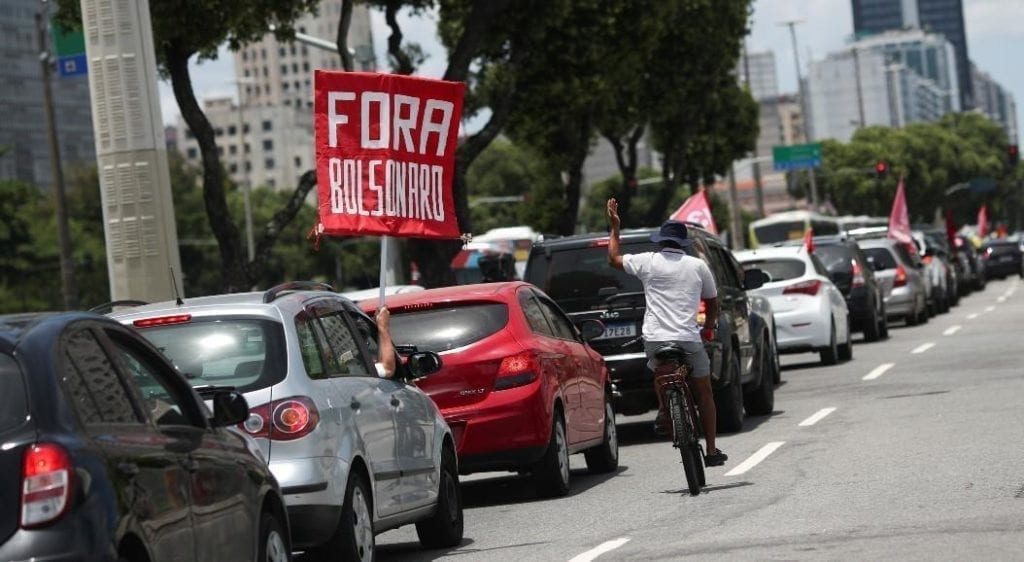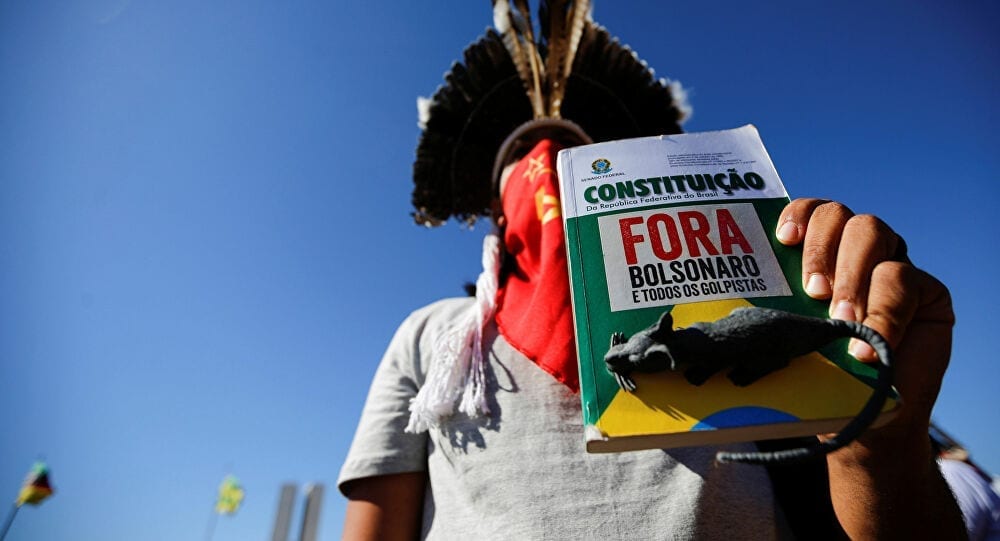On January 23, opposition movements and trade unions held protests in Brazil demanding the impeachment of the country’s leader, Jair Bolsonaro, in 17 Brazilian cities. What made Brazilians take to the streets? What was the theme of the protests?
Last Saturday, the main slogan of the protests was the accusation of the government of Jair Bolsonaro (port. – Jair Messias Bolsonaro) in the failure of the fight against the pandemic. On the streets of Rio de Janeiro, Sao Paulo and other major cities of the country, the Brazilians organized a rally, demanding the resignation of the head of state. It is worth noting that Brazil ranks second in the world after the United States in terms of the number of coronavirus victims: since the beginning of the pandemic, about 218 thousand infected people have died in the country. In turn, Bolsonaro has long opposed the introduction of strict quarantine restrictions. In addition, many unions are demanding the resumption of emergency payments to citizens.
At the very beginning of the pandemic in Brazil, there was already a split between federal and regional authorities. In his numerous statements, Bolsonaro called the coronavirus infection “mild flu” and “media hysteria”, and also argued that the economic consequences of isolation could be worse than from a dangerous virus. Regional authorities were in favor of tightening restrictions and the introduction of a temporary lockdown.

In the first months of the pandemic, a paradoxical situation developed in this South American country. At the federal level, representatives of the authorities, represented by the president, refused to introduce large-scale restrictions, stop factories and production, and did not advocate going into a regime of strict self-isolation. The federal government even launched the Campaign “Brazil Can’t Stop”, which encourages people to keep going to work, school and even attending religious events.
Nevertheless, at the municipal level, all 27 Brazilian states introduced strict quarantine measures in mid-March, similar to those in most countries in the region, according to the WHO guidelines. At that time, the governors were able to achieve this degree of independence thanks to the decisions of the Federal Supreme Court of Brazil. On March 28, the legislature secured the right of the heads of municipal governments to declare quarantine on their own, despite the directives of the federal center, and prohibited the country’s president from campaigning against quarantine. The final decision of the court was made on April 16.
Despite alarming numbers, the Brazilian head of state remains one of the four world leaders, along with the leaders of Belarus, Nicaragua and Turkmenistan, who deny the danger of COVID-19. According to polls by the international news and financial information agency Reuters, less than a third of the population supported the president’s line regarding the fight against COVID-19 at the end of April.
To date, a January 24 poll by the “Atlas politico” research center suggests that more than half of the Brazilian population is in favor of removing Jair Bolsonaro from the presidency. The start of the impeachment proceedings against the Brazilian leader is supported by 53.6% of respondents, while 41.5% are against Bolsonaro’s resignation. The specialists of this research center note that support for the impeachment of the head of state increases depending on the education and income level of the survey participants.
According to the study, the Brazilian leader enjoys the greatest support among men (51%) and Christian evangelicals (61%). An interesting observation was that one in five (20%) who voted for the candidacy of Bolsonaro in the second round of the 2018 presidential elections, now supports his impeachment.
According to the poll, support for the impeachment of the Brazilian president reached its peak (about 58%) in April last year after the resignation of ex-Minister of Justice Sergio Moro (port. – Sergio Fernando Moro), who was an unspoken symbol of the fight against corruption in this Latin American country.
On February 1, the elections of the Speakers of both Houses of the Brazilian National Congress will take place, which will decide the fate of Bolsonaro. The outgoing Speakers of the Chamber of Deputies and the Senate did not agree on a single strategy: one entered into a coalition with former political opponents, as it tries to stay in power, while the other preferred to work with the government to get a new high post. Not only the further alignment of forces in the political arena in Brazil, but also the future of the current leader depends on how the votes are distributed in these elections.

In order to assess the importance of the upcoming electoral process, let us turn to the fact that the Brazilian National Congress is a bicameral legislature consisting of the Chamber of Deputies (513 seats) and the Federal Senate (81 seats). Each constituent entity of the Federative Republic of Brazil is represented by three senators who are elected for a term of eight years. The deputies are elected for a four-year period by universal majority suffrage. The seats in the Chamber of Deputies are distributed in proportion to the population of Brazilian constituent entities.
The Speakers of the Chamber of Deputies play a vital role in the country’s legislature. They are elected by internal ballot for a term of two years without the possibility of re-election within the framework of one convocation of the National Congress. All key bills are in their exclusive competence. These include issues of impeachment of the head of state and vice-president of Brazil.
Based on the Brazilian Constitution of 1988, the impeachment procedure is initiated by the Speaker of the Chamber of Deputies, and the head of the Upper House, at his discretion, submits the bill to the Senate. According to the basic law of the Federative Republic of Brazil, the head of the lower house is also the third in the hierarchy of civil servants. Thus, if the head of state and vice president are removed from power, it is he who becomes the interim president.
Less than a week is left before the long-awaited elections. Against the backdrop of a growing protest movement and a record drop in support for the current leader, this electoral process may stop being just an administrative formality. If the pro-government candidate, Arthur Lira, wins, Jair Bolsonaro will not face impeachment proceedings, and his supporter will promote the bills necessary for the federal government. However, even if the “correct” candidate in the Chamber of Deputies is defeated, Bolsonaro will be able to count on the Senate, because the head of the Upper House of the National Congress has the final decision on the issue of removing from presidential powers. In the event of an alternative vote and the coming to power of opposition parliamentarians in both chambers, the federal government will have to forget about the implementation of previous bills, and Jair Bolsonaro will have to start preparing to launch the impeachment procedure.


